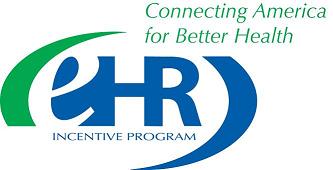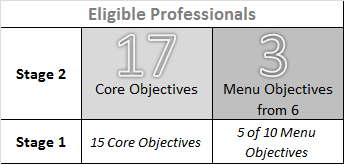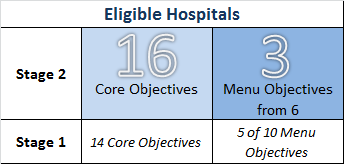 Dissecting Stage 2 of EHR Adoption
Dissecting Stage 2 of EHR Adoption
Stage 2 like Stage 1 includes core and menu objectives for both eligible professionals and eligible hospitals. Objectives are a key part of meeting meaningful use and receiving incentive payments. Here are the Stage 2 objectives.

Core Objectives – all are required.
- CPOE – Use CPOE for more than 60% of medication, 30% of laboratory, and 30% of radiology
- E-Rx – E-Rx for more than 50%
- Demographics – Record demographics for more than 80%
- Vital Signs – Record vital signs for more than 80%
- Smoking Status – Record smoking status for more than 80%
- Interventions – Implement 5 clinical decision support interventions + drug/drug and drug/allergy
- Labs – Incorporate lab results for more than 55%
- Patient List – Generate patient list by specific condition
- Preventive Reminders – Use EHR to identify and provide reminders for preventive/follow-up care for more than 10% of patients with two or more office visits in the last 2 years
- Patient Access – Provide online access to health information for more than 50% with more than 5% actually accessing
- Visit Summaries – Provide office visit summaries for more than 50% of office visits
- Education Resources – Use EHR to identify and provide education resources more than 10%
- Secure Messages – More than 5% of patients send secure messages to their EP
- Rx Reconciliation – Medication reconciliation at more than 50% of transitions of care
- Summary of Care – Provide summary of care document for more than 50% of transitions of care and referrals with 10% sent electronically and at least one sent to a recipient with a different EHR vendor or successfully testing with CMS test EHR
- Immunizations – Successful ongoing transmission of immunization data
- Security Analysis – Conduct or review security analysis and incorporate in risk management process
Menu Objectives – Select 3 of 6
- Imaging Results – More than 20% of imaging results are accessible through Certified EHR Technology
- Family History – Record family health history for more than 20%
- Syndromic Surveillance – Successful ongoing transmission of syndromic surveillance data
- Cancer – Successful ongoing transmission of cancer case information
- Specialized Registry – Successful ongoing transmission of data to a specialized registry
- Progress Notes – Enter an electronic progress note for more than 30% of unique patients

Core Objectives – all are required.
- CPOE – Use CPOE for more than 60% of medication, 30% of laboratory, and 30% of radiology
- Demographics – Record demographics for more than 80%
- Vital Signs – Record vital signs for more than 80%
- Smoking Status – Record smoking status for more than 80%
- Interventions – Implement 5 clinical decision support interventions + drug/drug and drug/allergy
- Labs – Incorporate lab results for more than 55%
- Patient List
Generate patient list by specific condition - eMAR – eMAR is implemented and used for more than 10% of medication orders
- Patient Access – Provide online access to health information for more than 50% with more than 5% actually accessing
- Education Resources – Use EHR to identify and provide education resources more than 10%
- Rx Reconciliation – Medication reconciliation at more than 50% of transitions of care
- Summary of Care – Provide summary of care document for more than 50% of transitions of care and referrals with 10% sent electronically and at least one sent to a recipient with a different EHR vendor or successfully testing with CMS test EHR
- Immunizations – Successful ongoing transmission of immunization data
- Labs – Successful ongoing submission of reportable laboratory results
- Syndromic Surveillance – Successful ongoing submission of electronic syndromic surveillance data
- Security Analysis – Conduct or review security analysis and incorporate in risk management process
Menu Objectives – Select 3 of 6
- Progress Notes – Enter an electronic progress note for more than 30% of unique patients
- E-Rx – More than 10% electronic prescribing (eRx) of discharge medication orders
- Imaging Results – More than 20% of imaging results are accessible through Certified EHR Technology
- Family History – Record family health history for more than 20%
- Advanced Directives – Record advanced directives for more than 50% of patients 65 years or older
- Labs – Provide structured electronic lab results to EPs for more than 20%
